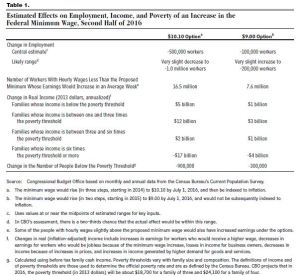Target: poverty
Number positively effected: 16,500,000
Number pushed above the poverty line: 900,000
900,000/16,500,000 = 5.45%
In his State of the Union address President Obama said: “It’s easy to remember, $10.10”. One option for increasing the minimum wage is to increase the federally mandated minimum to $10.10 an hour. Tuesday, the Congressional Budget Office released a report on The Effects of a Minimum-Wage Increase on Employment and Family Income. This report echoes what we teach in basic microeconomics. The first summary paragraph reads:
Increasing the minimum wage would have two principal effects on low-wage workers. Most of them would receive higher pay that would increase their family’s income, and some of those families would see their income rise above the federal poverty threshold. But some jobs for low-wage workers would probably be eliminated, the income of most workers who became jobless would fall substantially, and the share of low-wage workers who were employed would probably fall slightly.
That sounds like verbiage straight from a textbook!
Look at this table from page 2 of the report.
An increase in the minimum wage will benefit some at the expense of others. This CBO report shows just that. There is an estimate of 500,000 people losing their jobs while an estimated 16.5 million have wage increases and 900,000 people will cross the poverty level threshold because of the change. So the prediction is that the people earning minimum wage who keep their jobs will benefit while a substantial number of people will lose.
I’d like to use the report to amplify a point I made an earlier post. This report by the CBO supports how poorly targeted the minimum wage is for relieving poverty. At face value and 900,000 figure certainly sounds good. But the reality is that is 900,000 out of 16.5 million people that are affected. It’s only a little over 5% of the people affected by the increase in the minimum wage will be pushed over the poverty level threshold. That doesn’t sound too effective to me.

 Bert Wheeler
Bert Wheeler
 Jeff Haymond
Jeff Haymond
 Marc Clauson
Marc Clauson
 Mark Caleb Smith
Mark Caleb Smith
 Tom Mach
Tom Mach